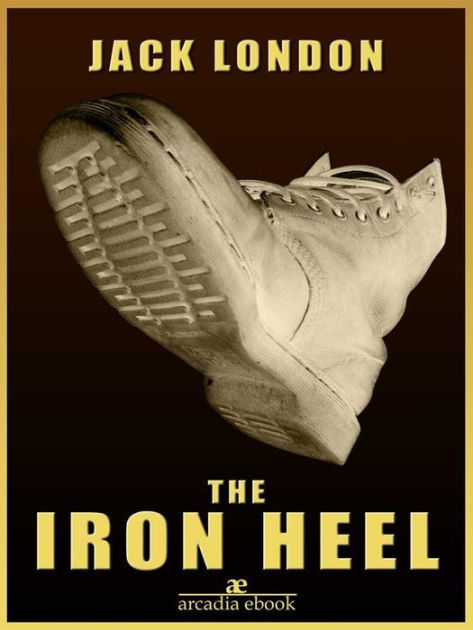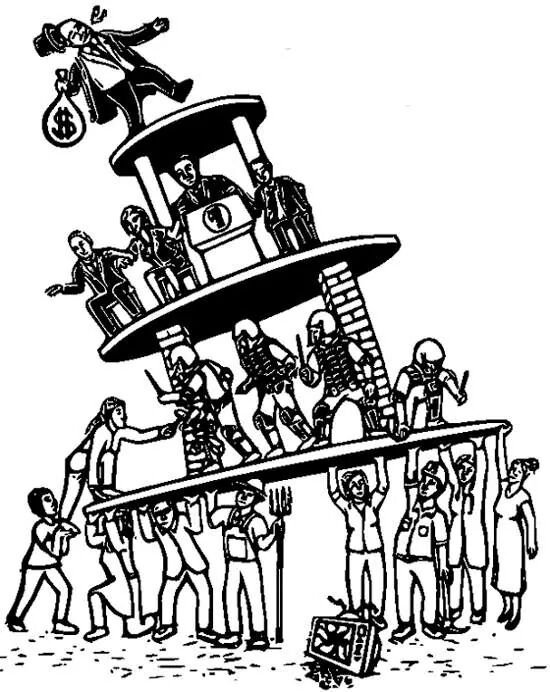
This one is important, dear reader.
Many people wonder why I bother to put these ideas out there.
I just shrug and smile.
They have to hoe their own row.
This is a total reprint of a portion of Mr. Whittingtion's work.
It is important, if you want to have a foreshadowing of what is playing out in the headlines today.
There is a reason that you know of 1984, but your 'greatest education ever' is a lie they tell you to keep the skool gravy train providing grist for the crapitalust mills.
AMERICAN POLITICAL THOUGHT Keith E. Whittington
Supplementary Material
Chapter 8: The Progressive Era – Political Economy
Jack London, The Iron Heel (1907)
Jack London was born just after the Civil War in San Francisco and raised in difficult economic circumstances.
He began working in a factory at the age of fourteen and subsequently traveled widely and bounced around different kind of work.
After a stint in jail, he resolved to return to high school, where he began writing essays and fiction.
By the turn of the century, he was starting to publish short fiction and then books, quickly achieving his greatest success with the novel The Call of Wild in 1903, which brought him both fame and fortune.
In 1905, he first tried his hand at politics, unsuccessfully running as a Socialist for the office of mayor of the city of Oakland.
His socialist activism peaked with the publication of his dystopian novel, The Iron Heel.
He remained a popular celebrity and prolific author until his early death in 1916.
The Iron Heel was London’s most political novel and reflects his Socialist commitments of the first decade of the twentieth century.
As with many of his novels, the protagonist of The Iron Heel is a fictionalized version of his own persona.
Ernest Everhard is a young Socialist activist and writer in early twentieth century California.
Over the course of the novel, Everhard warns of the coming collapse of democracy and capitalism and seeks to organize a proletariat revolution against “the Oligarchy.”
As he tries to explain to a group of middle-class businessmen, the plutocracy accounted for less than 1 percent of the American population but controlled 70 percent of the wealth.
The middle class was rapidly sinking into the “proletariat” to make up the other 99 percent, which as a whole were seeing their share of the country’s wealth declining.
By 1912, the plutocracy revealed itself as “the Iron Heel,” shut down democratic institutions, stole the remainder of the country’s wealth, and reduced the population to serfdom, with a favored caste of soldiers and elite laborers rewarded for their loyalty to the new regime and rest crushed into effective slavery.
Everhard plotted a revolution, but it is defeated in a vicious battle on the streets of Chicago, and he is executed.
The Iron Heel goes on to rule the world for hundreds of years before finally being overthrown in a socialist revolution that comes to celebrate Everhard’s early heroism.
The novel is framed as an incomplete memoir of Everhard written by his wife during those revolutionary struggles and eventually discovered and published centuries later after the fall of the Iron Heel.
The story gained perhaps greater resonance later in the twentieth century for its prescient vision of a totalitarian state using violence against its own citizens justified by the actions of agent provocateurs in what might now be called “false flag” operations, expansive networks of secret police and revolutionary cells, and a rigidly controlled system of economic and political privileges.
In this central chapter before the country collapses into fascism, Everhard attends a dinner at the home of his future father-in-law, a physics professor.
There he confronts a group of small businessmen who have their own complaints about the rise of the new trusts and massive corporations and seek to defend a nineteenth-century economic order of small proprietorships and isolated communities.
They represented convention Progressive reform views of the early twentieth century.
Everhard exposes their desires as self-interested nostalgia, arguing that the economy is going through a necessary stage of consolidation and enhanced productivity.
Rather than defending small capitalism, Everhard argues, they should join with the proletariat in preparing the way for corporate capitalism to give way to socialism.
It was just before Ernest ran for Congress, on the socialist ticket, that father gave what he privately called his “Profit and Loss” dinner.
Ernest called it the dinner of the Machine Breakers.
In point of fact, it was merely a dinner for business men—small business men, of course.
I doubt if one of them was interested in any business the total capitalization of which exceeded a couple of hundred thousand dollars.
They were truly representative middle-class business men.
There was Owen, of Silverberg, Owen & Company—a large grocery firm with several branch stores.
We bought our groceries from them.
There were both partners of the big drug firm of Kowalt & Washburn, and Mr. Asmunsen, the owner of a large granite quarry in Contra Costa County.
And there were many similar men, owners or part-owners in small factories, small businesses and small industries—small capitalists, in short.
They were shrewd-faced, interesting men, and they talked with simplicity and clearness.
Their unanimous complaint was against the corporations and trusts.
Their creed was, “Bust the Trusts.”
All oppression originated in the trusts, and one and all told the same tale of woe.
They advocated ownership of such trusts as the railroads and telegraphs, and excessive income taxes, graduated with ferocity, to destroy large accumulations.
Likewise they advocated, as a cure for local ills, municipal ownership of such public utilities as water, gas, telephones, and street railways. . . .
Having let them have their say, Ernest began asking questions right and left.
He began with Mr. Owen.
“You started a branch store here in Berkeley about six months ago?”
“Yes,” Mr. Owen answered.
“And since then I’ve noticed that three little corner groceries have gone out of business.
Was your branch store the cause of it?”
Mr. Owen affirmed with a complacent smile.
“They had no chance against us.”
“Why not?”
“We had greater capital. With a large business there is always less waste and greater efficiency.”
“And your branch store absorbed the profits of the three small ones.
I see. But tell me, what became of the owners of the three stores?”
“One is driving a delivery wagon for us. I don’t know what happened to the other two.” . . .
“Then the business game is to make profits out of others, and to prevent others from making profits out of you. That’s it, isn’t it?”
Ernest had to repeat his question before Mr. Asmunsen gave an answer, and then he said: “Yes, that’s it, except that we do not object to the others making profits so long as they are not extortionate.”
“By extortionate you mean large; yet you do not object to making large profits yourself? . . . Surely not?”
“I have listened carefully to all of you,” he began, “and I see plainly that you play the business game in the orthodox fashion.
Life sums itself up to you in profits.
You have a firm and abiding belief that you were created for the sole purpose of making profits.
Only there is a hitch.
In the midst of your own profit-making along comes the trust and takes your profits away from you.
This is a dilemma that interferes somehow with the aim of creation, and the only way out, as it seems to you, is to destroy that which takes from you your profits.
I have listened carefully, and there is only one name that will epitomize you.
I shall call you that name.
You are machine-breakers.
Do you know what a machine-breaker is?
Let me tell you.
In the eighteenth century, in England, men and women wove cloth on hand-looms in their own cottages.
It was a slow, clumsy, and costly way of weaving cloth, this cottage system of manufacture.
Along came the steam-engine and labor-saving machinery.
A thousand looms assembled in a large factory, and driven by a central engine wove cloth vastly more cheaply than could the cottage weavers on their hand-looms.
Here in the factory was combination, and before it competition faded away.
The men and women who had worked the hand-looms for themselves went into the factories and worked the machine-looms, not for themselves, but for the capitalist owners.
Furthermore, little children went to work on the machine- looms, at lower wages, and displaced the men.
This made hard times for the men.
Their standard of living fell.
They starved. And they said it was all the fault of the machines.
Therefore they proceeded to break the machines.
They did not succeed, and they were very stupid.
“Yet you have not learned their lesson.
Here are you, a century and a half later, trying to break machines.
By your own confession the trust machines do the work more efficiently and more cheaply than you can.
That is why you cannot compete with them.
And yet you would break those machines.
You are even more stupid than the stupid workmen of England.
And while you maunder about destroying competition, the trusts go on destroying you.
“One and all you tell the same story—the passing away of competition and the coming of combination.
You, Mr. Owen, destroyed competition here in Berkeley when your branch store drove the three small groceries out of business.
Your combination was more effective.
Yet you feel the pressure of other combinations on you, the trust combinations, and you cry out.
It is because you are not a trust.
If you were a grocery trust for the whole United States, you would be singing another song."
“But when you squeal you don’t state the situation flatly, as I have stated it.
You don’t say that you like to squeeze profits out of others, and that you are making all the row because others are squeezing your profits out of you.No, you are too cunning for that.
You say something else.
You make small-capitalist political speeches. . . .
Here are a few of his phrases I caught:
‘Our original principles are all right,’
‘What this country requires is a return to fundamental American methods—free opportunity for all,’
‘The spirit of liberty in which this nation was born,’
‘Let us return to the principles of our forefathers.’
“When he says ‘free opportunity for all,’ he means free opportunity to squeeze profits, which freedom of opportunity is now denied him by the great trusts.
And the absurd thing about it is that you have repeated these phrases so often that you believe them.
You want opportunity to plunder your fellow-men in your own small way, but you hypnotize yourselves into thinking you want freedom.
You are piggish and acquisitive, but the magic of your phrases lead you to believe that you are patriotic.
Your desire for profits, which is sheer selfishness, you metamorphose into altruistic solicitude for suffering humanity.
Come on now, right here amongst ourselves, and be honest for once.
Look the matter in the face and state it in direct terms.”
There were flushed and angry faces at the table, and withal a measure of awe. . . .
“. . . You see, you fellows have studied business, in a small way, but you have not studied social evolution at all.
You are in the midst of a transition stage now in economic evolution, but you do not understand it, and that’s what causes you all the confusion.
Why cannot you return?
Because you can’t.
You can no more make water run up hill than you can cause the tide of economic evolution to flow back in its channel along the way it came. . . .
“In the face of labor-saving machinery, of organized production, of the increased efficiency of combination, you could set the economic sun back a whole generation or so to the time when there was no great capitalists, no great machinery, no railroads—a time when a host of little capitalists warred with each other in economic anarchy, and when production was primitive, wasteful, unorganized, and costly.
But God has forsaken you small capitalists.
The sun of the small capitalists is setting.
It will never rise again. . . .
“This is the fiat of evolution. . . . Combination is stronger than competition. . . . It is combination versus competition, a thousand centuries long struggle, in which competition has always been wasted. Whoso enlists on the side of competition perishes.” . . .
“. . . Is it not true that the combination known as a trust produces more efficiently and cheaply than can a thousand competing small concerns?”
Still no one objected.
“Then is it not irrational to destroy that cheap and efficient combination?”
No one answered for a long time.
Then Mr. Kowalt spoke.
“What are we to do, then?” he demanded. “to destroy the trusts is the only way we can see to escape their domination.”
Ernest was all fire and aliveness on the instant.
“I’ll show you another way!” he cried.
“Let us not destroy those wonderful machines that produce efficiently and cheaply.
Let us control them.
Let us profit by their efficiency and cheapness.
Let us run them for ourselves.
That, gentlemen, is socialism, a greater combination than the trusts, a greater economic and social combination than any that has as yet appeared on the planet.
It is in line with evolution.
We meet combination with greater combination.
It is the winning side.
Come on over with us socialists and play on the winning side.”
Here arose dissent.
There was a shaking of heads, and mutterings arose.
“All right, then, you prefer to be anachronisms,” Ernest laughed.
“You prefer to play atavistic roles.
You are doomed to perish as all atavisms perish.
Have you ever asked what will happen to you when greater combinations than even the present trusts arise?
Have you ever considered where you will stand when the great trusts themselves combine into the combination of combinations—into the social, economic, and political trust?” . . .
“We will rise in our strength!” Mr. Asmunsen cried, and many voices backed his decision. “That will be civil war,” Ernest warned them.
“So be it, civil war,” was Mr. Asmunsen’s answer, with the cries of all the men at the table behind him. “We have not forgotten the deeds of our forefathers. For our liberties we are ready to fight and die.”
Ernest smiled.
“Do not forget,” he said, “that we had tacitly agreed that liberty in your case, gentlemen, means liberty to squeeze profits out of others.” . . .
“One more question.
When you rise in your strength, remember, the reason for your rising will be that the government is in the hands of the trusts. Therefore, against your strength the government will turn the regular army, the navy, the militia, the police—in short, the whole organized war machinery of the United States.
Where will be your strength then?” . . .
“You have said, a dozen of you tonight, that socialism is impossible.
You have asserted the impossible, now let me demonstrate the inevitable.
Not only is it inevitable that you small capitalists shall pass away, but it is inevitable that the large capitalists, and the trusts also, shall pass away.
Remember, the tide of evolution never flows backward.
It flows on and on, and it flows from competition to combination, and from little combination to large combination, and it flows on to socialism, which is the most colossal combination of all.”
The ownership of the world, along with the machines, lies between the trusts and labor.
That is the battle alignment.
Neither side wants the destruction of the machines.
But each side wants to possess the machines.
In this battle the middle class has no place.
The middle class is a pygmy between two giants. . . .
“. . . If labor wins, your way will be easy.
The United States, and the whole world for that matter, will enter upon a new and tremendous era.
Instead of being crushed by the machines, life will be made fairer, and happier, and nobler by them.
You of the destroyed middle class, along with labor—there will be nothing but labor then; so you, and all the rest of labor, will participate in the equitable destruction of the products of the wonderful machines.
And we, all of us, will make new and more wonderful machines.
And there won’t be any unconsumed surplus, because there won’t be any profits.”
“But suppose the trusts win this battle over the ownership of the machines and the world?” Mr. Kowalt asked.
“Then,” Ernest answered, “you, and labor, and all of us, will be crushed under the iron heel of a despotism as relentless and terrible as any despotism that has blackened the pages of the history of man.
That will be a good name for that despotism, the Iron Heel.”

If you think that your fakeducation did a good job of exposing you to broad spectrum of ideas, you are, mostly, sadly mistaken.
Read, while you still can.


Thanks for sharing this👍
Posted using Partiko Android
Downvoting a post can decrease pending rewards and make it less visible. Common reasons:
Submit
I hope you take the time to read it.
It is a pretty accurate depiction of what is happening around us.
Downvoting a post can decrease pending rewards and make it less visible. Common reasons:
Submit
Aqui mi visita amigo,saludos
Downvoting a post can decrease pending rewards and make it less visible. Common reasons:
Submit
Pretty fucking spot on .. especially considering it was written in 1907
Downvoting a post can decrease pending rewards and make it less visible. Common reasons:
Submit
Yep, funny how they don't teach this one in skool.
Downvoting a post can decrease pending rewards and make it less visible. Common reasons:
Submit
The only thing school teaches is how to go do something you hate for 8 hours a day.. that way you'll grow up and be a good tax slave
Downvoting a post can decrease pending rewards and make it less visible. Common reasons:
Submit
Well, that and go along to get along.
Sticking out from the crowd gets you whispered about behind your back.
Stincing conformists,...
All sitting quietly with their hands on their knees.
Nodding respectfully to their overlords.
Look of hopeful optimism on their faces.
shudders
Downvoting a post can decrease pending rewards and make it less visible. Common reasons:
Submit
An excellent post and read! Thanks for sharing!
Posted using Partiko Android
Downvoting a post can decrease pending rewards and make it less visible. Common reasons:
Submit
Yep, np.
Thanks for reading,...
Downvoting a post can decrease pending rewards and make it less visible. Common reasons:
Submit